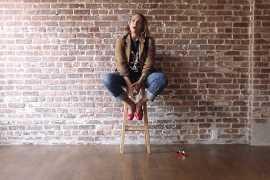“I give my kids plenty of attention. What’s so special about Special Time?” – Emilee
Every parent I know who has started doing Special Time with his or her child has told me that they see significant changes in their child’s behaviour. Parents often say that their child seems to respond to it as if they’ve been missing an essential nutrient. In a way, they have.
Why? Because we live in a stressful culture that disconnects us from each other, from our feelings, and from our own inner wisdom. Special Time is the antidote for parents and children, an essential nutrient that heals the upsets and disconnections of daily modern life. Specifically, Special Time:
- Reconnects us with our child after the separations and struggles of the day, so she’s happier and more cooperative.
- Gives the child the essential–but unfortunately so often elusive–experience of the parent’s full, attentive, loving presence.
- Gives the child a regular opportunity to express scary feelings and ideas to a compassionate, trusted adult who will listen and help her work them through using her own natural language: Play.
- Gives the child a safe place to work through the everyday issues that all kids need to work through, such as feeling powerless, by reversing the roles and letting the child lead.
- Deepens our empathy for our child so that we can stay more compassionate and see things from their point of view, which strengthens the connection and our parenting.
- Builds a foundation of trust and partnership between parent and child, which is a precondition for them to trust us with their big feelings when they’re upset (as opposed to lashing out), so improves the child’s behaviour.
- Convinces the child on a primal level that she is central to the parent, that she really matters, that she is important. (You know she is, but children often wonder.)
- Restores the parent’s joy in parenting because the parent-child relationship becomes sweeter.
Think of Special Time as preventive maintenance to keep things on track in your family. And if you’re having issues with your child, it’s the first thing to change. Often, it’s the only thing you need to change.
Clearly, every child benefits from Special Time with each parent on a regular basis. How often? At the risk of sounding like your dentist telling you to floss, every day would be ideal — but once a week is substantially better than never! Start where you can.
How do you do it? Here are my top ten tips.
1. Announce that you want to have special time with each child.
This will be for ten minutes a day (or 20, if you can swing it), as often as you can. Call it by the most special name there is — your child’s name. So in your house it might be Talia time or Oliver time.
2. Choose a time when any other children are being looked after by someone else…
…unless they’re old enough to stay safely occupied without adult supervision. If you have more than one child, you’ll want to set up a schedule, so all siblings know their special time is coming soon. One good strategy for siblings as you do time with one child is an audio book, which absorbs their attention enough to keep them from noticing you laughing with their sibling. (Headphones are essential, and if they need something to do with their hands, give them drawing materials to illustrate as they listen. Great for brain development!)
3. Set a timer for ten minutes.
Turn off all phones so you can’t hear incoming calls. Is ten minutes long enough? I suggest starting with ten minutes because it will seem like an eternity if you aren’t used to being fully present in the moment with another person. Don’t worry, it gets easier, and you do start to enjoy it!
4. Decide if you will also have other time most days to roughhouse with your child to get her laughing.
Roughhousing is also essential, but it can often involve more than one child. If you can squeeze in some roughhousing and laughter at another point in the day, then daily Special Time is your child’s to use as she sees fit. But if not — let’s say you work outside the home and have limited time with your child — then you do need to reserve some time for roughhousing. In that case, I recommend that you alternate days. The first day, your child decides how to use the Special Time. The next day, you get to decide, and you always choose roughhousing/laughter.
5. Say ”I am all yours for the next ten minutes…”
“The only things we can’t do are read or use screens. This time is just to play. What would you like to do?”
Or, if you are including roughhousing in special time, add “Today you get to decide what we will do with our ‘Jonah time.’ Tomorrow, I get to decide. We’ll alternate.”
6. Follow your child’s lead with 110% of your attention with no agenda and no distractions.
Just connect to your child with all your heart. Really notice your child and follow his lead.
If he wants to play with his blocks, don’t rush in to tell him how to build the tower. Instead, watch with every bit of your attention. Occasionally, say what you see without interfering: “You are making that tower even taller…. you are standing on your tiptoes to get that block up there…”
If she wants you to pull her in a circle on her skates until she falls down, over and over, resist “teaching” her to skate. Consider it your workout for the day, and make it fun: “For special time, my daughter took us out into the cul-de-sac to roller skate. I pulled her in a circle round and round so hard and she laughed and laughed until she fell on the ground. She kept coming back for more. After all this laughing, we had a great night!”
Resist the urge to judge or evaluate your child. Don’t take control or suggest your own ideas unless he asks. Refrain from checking your phone. Just show up and give your child the tremendous gift of being seen and acknowledged. (If you’ve ever really been seen and appreciated, you know just how great a gift this is.) Your child may not be able to articulate it, but he will know when you’re really being present with him. Kids sense our presence and they “follow” it like a magnet.
7. What if they want to do something they aren’t usually allowed to do?
Consider whether there’s a way to do it safely, since you’re there to help and keep them safe. Maybe you always tell her that it’s too dangerous to jump off the dresser onto the bed, but for special time you can push the bed next to the dresser and stay with her as she jumps to be sure she’s safe. Maybe he’s always wanted to play with his dad’s shaving cream, but you weren’t about to let him waste a can of it, or to clean it up. For special time, you might decide to gift him with his own can of cheap shaving cream and let him play with it in the tub, and then the two of you can clean it up together. If you can’t grant her desire (go to Hawaii), find a way to approximate it (make grass skirts and play hula dancing together.)
Why bother? Your child learns that you really do care about his desires, even if you can’t always give him what he wants (so he’s less likely to feel like he never gets his way, and more likely to cooperate in general.) And since these desires will no longer be forbidden fruit after your child has a chance to indulge her curiosity and experience them, she’s less likely to try them behind your back.











